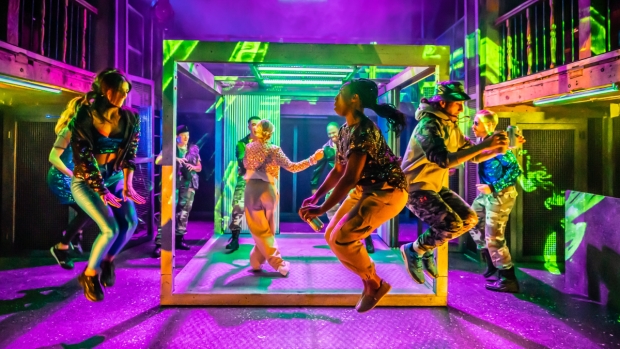”Othello” at the Watermill – review

© Marc Brenner
‘Adapted by Karla Marie Sweet’ is the arresting subheading in the Watermill’s publicity – though the theatre’s fearlessly ambitious approach to every production is a given. This is not a musical but a production threaded through with found music that moves along the action, provides insights into the characterisation and intensifies the mood. Co-directed by Anjali Mehra (who is also responsible for the fluid and often poignant choreography) and Paul Hart, the venue’s artistic director, the ten-strong cast are seasoned all-rounders, most of whom are multitalented musicians too.
The tunes – transformed by musical director and arranger Nadine Lee – include a poignant account of Emeli Sandé’s “Hurts” and Billie Eilish’s “bad guy”. Later hits include fresh accounts of 20th-century standards “Dream a Little Dream of Me”, an especially apposite and telling “Killing Me Softly” (with his song); and The Flamingoes’ “I Only Have Eyes for You”.
The platform above the length of the theatre provides both a vantage and focal point for the multi-talented actor/musicians who make up most of the cast. It works especially well as a perch for Laura Andresen Guimarães’ extraordinary turn as a feisty and authoritative Bianca (Cassio’s former love), who proves to be an extraordinarily versatile musician on wind, strings and percussion. This being the Watermill, she is joined on percussion by other cast members, including Molly Chesworth’s newly married Desdemona, luminous in her love for Othello and definitely not a passive victim! The plangency of the cellos played by Benedict Salter (Duke of Venice and Lodovico) and the sax, clarinet and flute, all underline and comment on the tragedy enacted by the players.
Every designer makes use of the theatre’s intimacy and the levels possible on its deceptively small stage. Here, Cecil Calf’s revolving cage provides the intimacy of the bedroom, while also being cleverly at odds with how it spotlights those within to those without (also thanks to Ali Hunter’s lighting).
This “room where it happens” is also the command centre, where monochrome and khakis are the dress code for an army in the field, combating the Turkish invasion of Cyprus (which may bring to mind the current situation in Ukraine, though it does not seem uppermost here). The contrast with Desdemona’s bridal and wedding night gown is stark, given her fate. Beyond this, there are also life-enhancing sequences when the mood is lightened by musical fantasy moments, made especially wondrous when the cast burst onto the stage transformed in multi-coloured sequins. At this point they become an all-singing, dancing band and ensemble – lit with all the colours of the rainbow.
Despite these upbeat moments, issues and themes of race and racism are central from the getgo, with a programme essay noting a human hierarchy in which Blackness comes way down the list. Iago, using venomous jealousy to justify his actions, exploits Othello’s own self-doubt, even self-loathing.
The tragedy is made all the more shocking because Kalungi Ssebandeke’s Othello is so powerful in his dignity and his ardent love for his new wife. But the tension and self-doubt simmering underneath are evident from the moment he is shopped by Iago to his new wife’s mother. Augustina Seymour’s Brabanzi (an especially effective gender change) is frightening in her outrage at her daughter’s marriage to ‘the Moor’.
Chioma Uma excels as Emilia, Desdemona’s waiting gentlewoman and unfortunate wife to Iago, a wonderfully feisty woman with agency, despite the murderous machinations of her husband.
The casting of Sophie Stone (a wonderfully watchable Hermia in Dream at the Watermill in 2018) as Iago hardly raises an eyebrow for either her gender or her deafness. She plays it loud, coarse and in yer face, as if she has carved out this space for all her minions, buddies and indeed superiors.
There’s not a weak link here, so Yazdan Quafouri makes a nicely macho peacock of Cassio, that other object of Iago’s violent vengeful machinations. Along with Ediz Mahmut’s Roderigo and Damien James Montano he also provides vital colour and depth to the sound, particularly through electric guitar, ukulele and piano.
It was a delight to see a party of schoolchildren at press night, their attention rapt throughout and leading the applause and cheering at the curtain call. They were celebrating a production that will surely leave them wanting more Shakespeare – especially from actor/musicians.












